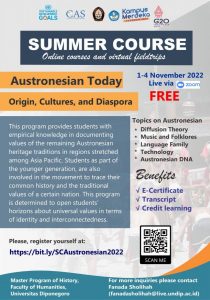Summer Course on Austronesian Today: Origins, Cultures, and Diaspora
Organized by Master Program of History, Faculty of Humanities, Universitas Diponegoro
Call for Application
 Objectives
Objectives
Senior researcher Ronnie Hatley mentions that the origins of Indonesian people are not only from one place. It is based on the consideration that Indonesia’s strategic geographical location, at the crossroads of trade and international routes, allows Indonesia the past to be visited by many foreign residents. One of the ancestors who dominate Indonesia is known to be the Austronesian tribe. Nusantara became one of the overseas destinations for Austronesian tribes after crossing Taiwan, along the coast of Southeast Asia (Champa Beach), to go to Madagascar. Austronesian tribes became the ancestors who brought the forerunner of Indonesian culture and language. Austronesian tribes also contributed to advancing agriculture in the archipelago. They are also known to have advanced irrigation technology such as swales and terraces.
The migration process that occurred seemed to be the turning point of human civilization in Southeast Asia, especially Indonesia because the culture they brought quickly spread and became a culture that now still survives. The problem is how the process of the spread of Austronesian speakers and its influence on culture in Southeast Asia. The aspects of the discussion in this study are the development of Austronesian-speaking culture and society in the period 4500-1500 years ago, as well as an Austronesian exploration across the Indian Ocean.
In this regard, the Master Program of UNDIP plays an active role in studying the migration and diaspora of Southeast Asian nations to explore common values on cultural, genetic, and history and provide solutions to the identity problems which is faced by Asian nations nowadays, especially Indonesian, in raising awareness of identity via this summer course program.
This program provides students with empirical knowledge in documenting the values of the remaining Austronesian heritage traditions in regions stretched among the Asia Pacific. Students as part of the younger generation, are also involved in the movement to trace their common history and the traditional values of a certain nation. This program is determined to open students’ horizons about universal values in terms of identity and interconnectedness.
Main Activities:
- Lecturing which contains orientation of the material about an overview of the history, culture, genetics, and diaspora of the Austronesian people in Southeast Asia, especially in Indonesia.
- Virtual fieldtrips
- Presentation and discussion by students.
Topics:
- Austronesian diaspora: a new perspective
- Austronesian migration theory
- Drawing’ the distant Austronesian relative home’
- Austronesian DNA
- Connections and traditions among Austronesian descents
- Austronesian language family
- Austronesian folklore and music
- Documenting Austronesian heritages: Austronesian rock arts
Invited speakers
- Prof. Dr. Pierre-Yves Manguin (EFEO Institute, France)
- Prof. Dr. Herawati Sudoyo (Mochtar Riadi Institute for Nanotechnology, Universitas Pelita Harapan, Indonesia)
- Prof. Dr. James T. Collins (Institute of Ethnic Studies, National University of Malaysia)
- Prof. Dr. Ismail Ali (University Sabah Malaysia, Malaysia)
- Gazi Mizanur Rahman, Ph.D. (BRAC University, Bangladesh)
- Adhi Agus Oktaviana, Ph.D. (Cand) (National Research and Innovation Agency, Indonesia and Griffith University, Australia)
- Dr. Phil. Stefan Danarek (Lund University, Sweden)
- Tim Cole (Co-founder “Small Island Big Song”, music producer, filmmaker, Australia)
- Dr. Dan Bendrups (La Trobe University, Australia)
Participants
We seek international and Indonesian students who have an interest in the study of the Austronesian diaspora. All of them are able to join for FREE. Please register now at https://bit.ly/SCAustronesian2022. Registration will be closed on 30 October 2022.
Benefits
- Transcript
- E-certificate
For further info, please do not hesitate to contact us (misej@live.undip.ac.id or fanadasholihah@live.undip.ac.id)